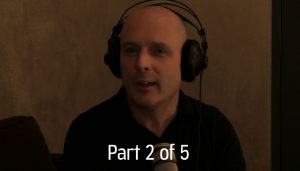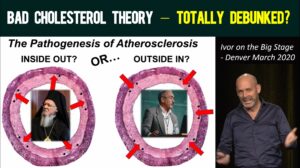FULL EPISODE NOW RELEASED: https://thefatemperor.com/dr-paul-mason-advanced-cholesterol-and-much-much-more-full-podcast-ep26/
Part 4 of 5 of conversation with super well-researched Australian doctor Paul Mason @DrPaulMason – recorded in Boulder, Colorado. More nuggets of wisdom 🙂
Full podcast released at the weekend – for those who want to pig out on excellent insights, all in one go 🙂
SUBSCRIBE here for latest releases: https://www.youtube.com/channel/UCPn4FsiQP15nudug9FDhluA
Here is the summary of PART 4 content – scroll down for the Transcript:
INDEX/CONTENT PART 4 of 5:
00:00:02 CGM and problematic medications – better to fix root cause?
00:04:16 Let’s look at Lectins – the taxing toxins from plant world foods
00:10:21 Parkinson’s Disease and the Lectin Connection
TRANSCRIPT for PART 4 of 5:
Ivor 00:45:58 So this Continuous Glucose Monitor, a massively powerful tool and the watches are coming out now and people are getting CGM and the hackers/bio hackers.
Paul 00:46:06 What you’ve got, you’ve got this little device where you actually get push measurements too from the CGM. So rather than having to swipe, that will actually push it to your phone every five minutes. So you don’t even have to swipe.
Ivor 00:46:18 All right. So if you drop a filthy kebab, you know…
Paul 00:46:22 … there’s no hiding. Well, I love the continuous glucose made up because there’s no hiding from it. So I had a patient a little while ago, and… you know, I get my patients through food diaries and I can try and understand their patterns and also looking at their bloods. And I was looking at a food diary, and and my filter in my brain was working. It said, you know, “Just be careful what you say. Don’t call her a liar.” And I’m just sort of saying, “So, I’m just having trouble reconciling your results with your food diary.” And I just had a puzzled look. And she looked at me like I was an idiot. And she said, “I’ve been doing a food diary for 10 years, and I’m the only person who ever sees it. And I still lie on that food diary. What makes you think I’m going to be honest on a food diary that you’re going to see?” I thought, “You know what? That makes perfect sense.
Ivor 00:47:12 Human nature.
Paul 00:47:12 People can lie to themselves, but you can’t lie to a CGM.
Ivor 00:47:16 No. And anyone who comes in with a high calcification score and in CAC scan, or has serious heart disease, become symptomatic, or any other reason, one of the first things they should do is get a CGM, because I know they’re going to get certain meds and all and they’re going to change their diet. And hopefully they understand low carb as needed or keto along with many other things. But a CGM is the first thing that a person with heart disease or a person who suddenly got a really high CAC score needs.
Paul 00:47:46 100%.
Ivor 00:47:47 Yeah, it’s a no brainer.
Paul 00:47:49 It’s a clinical utility. I mean, for me, it’s absolutely been a game changer. And I’ve actually steered away from pushing ketone testing as much, because what happens? What happens? If you have somebody come in and they have a one hour insulin of say 200 or if it was 300, but you know, very, very insulin resistant, how likely are they going to be able to enter ketosis, even if they’re on 20 grams a day? Not on God’s green earth. They’re not. But they can still lose weight by being lower carb. So it becomes more important. And if we have the goalpost that they’re striving for being ketosis, they’re going to become dissatisfied. If we set the goalpost to something they can achieve, and that’s a flat blood sugar, then that’s something that they’re actually much more in control of.
00:48:36 Now there’s some circumstances, some people have a horrible dawn phenomenon. And some people they have autoimmune diseases. I mean, you know, the difficulties in people on prednisone or other corticosteroid medications. It’s absolutely amazing. I should show you some of the traces. I mean, in medicine we get taught, “Oh, they make it much more low, make it harder for you to get blood sugar control ra, ra, ra” that when you actually see it. So you might be on 10 ground milligrams of bread and it might be pushing your blood sugar up to 15 for five hours a day or something.
00:49:10 You know, the changes you see are just huge. And I think, I certainly as a doctor, I had no concept that it was so massive. And I mean, we blame you say, “Well, you’re going to have to just try a little bit hard and a on steroids to control your sugar.” “Maybe, you know, do a sliding scale a bit more often.” Bollocks! It’s never going to work.
Ivor 00:49:33 So you need to get them off these agents or ideally…
Paul 00:49:36 Well I’ve got a patient at the moment. She came to see me on 40. I had an email because I’m sharing her care, she’s actually not from Sydney, and she’s down to 15 so far without any flares. She’s got a condition called polymyalgia rheumatica, which if you if you drop it down too quickly, you’ll get a big player and not a pleasant state. But, you know, even the drop from 40 to 15, it’s made a big difference, but the residual 15 is still causing her a hell of a lot of troubles.
Ivor 00:50:04 So ideally, by adopting the optimum diet and beginning to fix all of the dysfunction that’s going on there, then you can go lower later on maybe in those meds?
Paul 00:50:16 Well what it is, so I’m actually, I’m a big fan now of I guess what’s more commonly known as autoimmune protocol diets using restriction of lectins. So we see often, and do establishing that kind of diet and these people actually allows us to accelerate the dose reduction a little bit quicker than what would otherwise have expected.
Ivor 00:50:41 Now that’s a fascinating topic in and of itself. Actually, I was just chatting, I did a podcast this morning with Mikhaila Peterson. We had a great chat, obviously an extreme case of autoimmune. But autoimmune is everywhere and cardiovascular disease now essentially can be looked at as an autoimmune disease. There’s so many more disease, as you mentioned Alzheimer’s. So maybe let’s talk about autoimmunity catastrophe in the world today and the types of foods that can help trigger it.
Paul 00:51:10 But before we do, let’s just talk about the craft test in lectins.
Ivor 00:51:15 Right.
Paul 00:51:17 Lectins, and a lot of people don’t realize this, so say wheat germ agglutinin (WGA), can actually bind to the insulin receptor. And it binds to it in a way that it activates it for a lot longer, a prolonged duration compared to just straight insulin. So if you’ve had people who, I’ve got lots of patients who have been on a keto diet that’s heavily plant based, you know, a few lectins in there, and when they’ve gone and cut out a lot of those lectin sources, they’ve lost a hell of a lot of weight upwards of 10 kilos, effortlessly.
Ivor 00:51:56 20 pounds, 25 pounds, yeah? American units.
Paul 00:51:59 Yeah. I think this impact of the lectins on the insulin receptor. Also the lectins have been shown to create leptin resistance.
Ivor 00:52:13 There’s the big issue.
Paul 00:52:14 So if you combine activation of the insulin pathways and leptin resistance, then you can see how these lectins can be so problematic.
Ivor 00:52:23 Lectins. Now, they also directly attack the lining of the arteries, the glycocalyx and many other things. Maybe speak a little on that.
Paul 00:52:32 So the definition of a lectin is it’s a carbohydrate binding protein. And on the surface of our cells, we actually have little what we call proteoglycans, so little proteins with sugar on the tip. And as you know, sugar is a carbohydrate. So if you’re a carbohydrate binding protein and you see a sugar that’s attached to the surface of the cell, what you’re going to do? You’re going to attach to it. And I mean that obviously requires the correct receptor binding affinity, so not every lectin will bind with a proteoglycan but a lot of them will. And this process of attaching to it damages it.
00:53:07 We can have a look at what it does if it attaches to the glycocalyx. We can have a look at what it does if it attaches a glycocalyx in the blood vessel. Either way, both steps of attachment will damage that lining.
Ivor 00:53:21 And they could be extremely deleterious, not just a mild impairment or problem but really severe damage to crucial membranes and component.
Paul 00:53:29 Well, let’s take the gut. So leaky gut syndrome. So a lot of people don’t realize that gluten, or wheat germ agglutinin (WGA) is actually a lectin. That will induce leaky gut that will allow the lining of the intestine to become more permeable towards content. So if eat these lectins and you have intestinal permeability, then they’ll be able to cross into the circulation and meet the immune system. Bacteria in the gut that are normally, that are normally confined to the gut will be able to enter and meet the immune system.
00:54:03 And here’s the problem, and this is where autoimmune disease gets triggered is that the immune system will identify a fragment of a bacterial capsule or a lectin and it will will amount an immune response against it because it’s a foreign pathogen. That’s fair enough. And then you have these what I called antibodies. They’re sort of like little, think of it like a search like you know, in a bombing raid and you just want to lock onto it, and these lectins will identify something for destruction or these antibodies will identify something for destruction. Now, what happens if the antigen or the particular molecular pattern that the immune system is identifying on a lectin, what happens if that is replicated on the surface of a healthy tissue cell?
Ivor 00:54:54 Yeah, like in type 1 diabetes.
Paul 00:54:55 We then have something called molecular mimicry and you end up initiating tissue destruction of a healthy cell. And that’s the basis of autoimmune diseases.
00:55:07 You basically need to have three things lineup. You have to pick the wrong parents. You have a genetic susceptibility. And that’s a big one. That’s quite important. You need to then have increased intestinal permeability. And then you also need to have passage of substances across the intestine like bacterial fragments or lectins that will induce this molecular mimicry type response. You have that, and then depending on what particular antigen you mounted a immune reaction to, your immune disease could target the bitter islet cells in the pancreas, it could target a nerve sheath cell, it could target a kidney cell. There’s a manifestation which is absolutely “protean”.
Ivor 00:55:55 Absolutely. And of course, although the genetic component is important, if you remove the environmental one and that never occurs, chances are you’ll never develop the autoimmune condition.
Paul 00:56:07 Yeah.
Ivor 00:56:07 Do you think it’s requisite to have the environmental insult that triggers the molecular mimicry? In other words, no one is genetically predetermined to get the autoimmune. Or at least very few.
Paul 00:56:21 I don’t look, but you can get a damn big reduction. I’ll pick a condition, Parkinson’s disease. So this is a disease of the neurons in the brain that secrete a neurotransmitter called dopamine. So that is actually likely to be caused by lectins. This sounds like a crazy convoluted story. So what happens is you actually have these lectins say, pass through the intestine and they end up from the stomach. They can actually enter a nerve called the vagus nerve which travels all the way up to the brain and they can ascend up the nerve to the brain, to the brain cells that secrete the dopamine and essentially caused Parkinson’s disease. And that sounds like such a ludicrous kind of explanation.
00:57:15 There would be an easy way to test it, right? So you’d cut the vagus nerve. That’s the highway that these lectins are using to ascend to the brain. So if that were the case, you could just simply cut that and you shouldn’t get Parkinson disease anymore. So, the Danes did a study. It was between, I think it was 1972 and 1995. So everybody who had this operation called vagotomy where they cut the nerves, and they put them into a registry and they compare them to an equivalent control group for the rate of Parkinson’s disease, and they followed them like over 20 years. And they found that the rate of Parkinson’s disease was reduced by 47%. When they’ve actually done studies in animals, I think it might have been dogs. They actually gave them lectins and something else to increase their intestinal permeability. And they actually labeled these lectins so they made them traceable so you could actually see them, and then they euthanize them. And when they biopsied the brain, they could actually see this P lectin that had fed them was now sitting on the dopamine secreting neurons in the brain.
Ivor 00:58:23 Cross the blood brain barrier.
Paul 00:58:24 Yeah. Well, here’s the thing. So very similar, the same pathway that intestinal permeability is caused by its up regulation of something called Zonulin which then releases tight junctions so the proteins that hold the cells together in the gap. You know Zonulin works in the brain as well? You know that can work on the blood brain barrier?
Ivor 00:58:47 Right. So even the BBB is subject Zonulin, loosening the junctions?
Paul 00:58:53 Yes.
Ivor 00:58:54 Wow! I wasn’t actually sure of that at all. So lectins are a huge problem but in plant foods, there are many lectins spread throughout the whole plant world. So who knows which person is going to get an autoimmune problem relating to which plant world food.
Paul 00:59:08 Luckily, so there’s over 119 plant sources of leptins described at last paper I read, there’s probably more. But you know, that’s still a lot. I mean, quite a bewildering variety. But we know where a lot of the harmful ones come from. So peanut agglutinin, and wheat germ agglutinin, soybean agglutinin, fat agglutinin, and that’s a particularly good one, that’s from red kidney beans. You know what, if you feed a rat 1% of raw kidney bean for two weeks, you’ll kill it?








